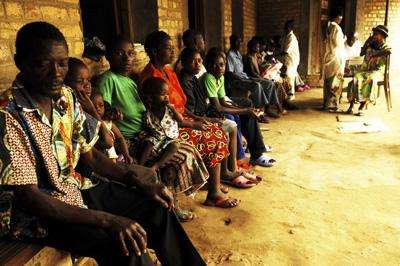Kinshasa, DRC, October 14, 2009 – One year after violence erupted in Haut-Uélé district, in northern Democratic Republic of Congo (DRC), attacks and clashes have now expanded to new areas, forcing hundreds of thousands of people to flee. Humanitarian organizations have failed to meet the massive needs that have resulted and an urgent response with greater presence in the rural areas of Haut-Uélé and Bas-Uélé is imperative, said the international humanitarian organization Doctors Without Borders/Médecins Sans Frontières (MSF).
Since late 2008, the civilian population of Haut-Uélé and Bas-Uélé has been caught in a dramatic cycle of violence linked to attacks perpetrated by the Ugandan rebel group the Lord's Resistance Army (LRA), and the Ugandan and Congolese offensive against the LRA. As the situation deteriorates, civilians also find themselves facing increasing banditry.
"The local population is the target of violence: murder, kidnapping and sexual abuse," said Luis Encinas, coordinator of MSF operations in Central Africa. "We are talking about tactics of violence aimed at instilling fear in the people. Our patients have told us the most brutal stories – about children who are forced to kill their parents and people burnt alive inside their homes."
The violence and armed confrontations have gradually expanded, now stretching from Haut-Uélé into Bas-Uélé in northeastern DRC, as well as in the neighboring regions of southern Sudan and eastern Central African Republic.
Hundreds of thousands of people have been displaced over the last year. Ongoing attacks continue to send thousands fleeing to seek shelter and greater security in towns. The population of Doruma city has tripled. The towns of Gangala and Banda are each hosting more than 20,000 displaced without assistance. These locations have become enclaves with outlying fields and villages left deserted.
In several places like Dingila or Niangara, MSF remains the only humanitarian organization present. "New people are being displaced every day in the region," said Pierre Kernen, MSF coordinator in Niangara, a town located in western Haut-Uélé. "They have been forced to flee one time, two times, three times. They have sought shelter with local families or in empty buildings but they still don’t feel safe there. MSF is providing medical and psychological care, but we have our limits. These people also urgently need food, clean water, shelter and proper living conditions."
Due to insecurity and the absence of roads in these very isolated areas, MSF has had to use airplanes to bring supplies, drugs and staff to most of its project locations. "Delivering humanitarian aid to the people of this region is of course a challenge, but we believe much more can and must be done to address the consequences of this war on the population," said Encinas. "Humanitarian organizations should urgently address people’s needs in areas that are most affected by the fighting and have so far been neglected."
MSF is currently working in Dingila, Doruma, Dungu, Duru, Faradje, and Niangara, providing over 9,000 medical consultations a month in hospitals and health centers. MSF has also distributed relief items to some 16,000 people displaced by violence, as well as vaccinations and mental health support. Twenty-seven international staff work alongside 140 Congolese colleagues in MSF projects in Haut-Uélé and Bas-Uélé.




